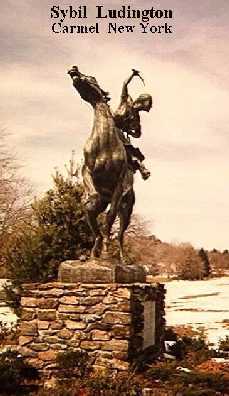
Sybil Ludington had just recently turned sixteen when on the rainy night of April 26 1777 she was called on to "raise the alarm" for her father Col. Henry Ludington commander of the 7th Regiment of the Dutchess County Militia.
The British army had made a surprise attack on Continental Army supplies stored at Danbury Connecticut. The glow in the sky from the burning town could be seen from the Ludington's farm, ten miles to the west. Sybil, the oldest of 12 children, left at 9 P.M. to rouse the country-side and with her horse "Star" covered 40 miles, mostly through rough countryside, arriving home near dawn, soaked and mud-spattered. Courageous Sybil not only had to avoid the British, but face the fear of meeting up with "Skinners or "Cowboys." Cowboys were pro-British loyalists who stole for the British army, and Skinners were not really loyal to either side and stole and killed at random. The militia did not arrive in time to save the town, but were able to harass British General William Tryon's troops as they withdrew from Connecticut.
After the war, when Sybil's life had returned to normal, she married a Catskill lawyer named Edward Ogden and had only one son, Henry .
Sybil Ludington died in 1839 and was buried near her father in the old cemetary at Patterson New York.
One of her grand-children, Captain Edmund A. Ogden, a West Point graduate, established Fort Riley, Kansas.
The Postal Service honored her with a stamp in 1975.
Today, historical markers trace the route of her "midnight ride" through Putnam County.
Her statue by Ann Hyatt Huntington guards the shore of Lake Gleneida in Carmel, New York.
More pictures taken by Russell Bass relating to Sybil Ludington. Thanks Russell!
Return to Monograph of Gideon Baxter Travis
Return to Main Page